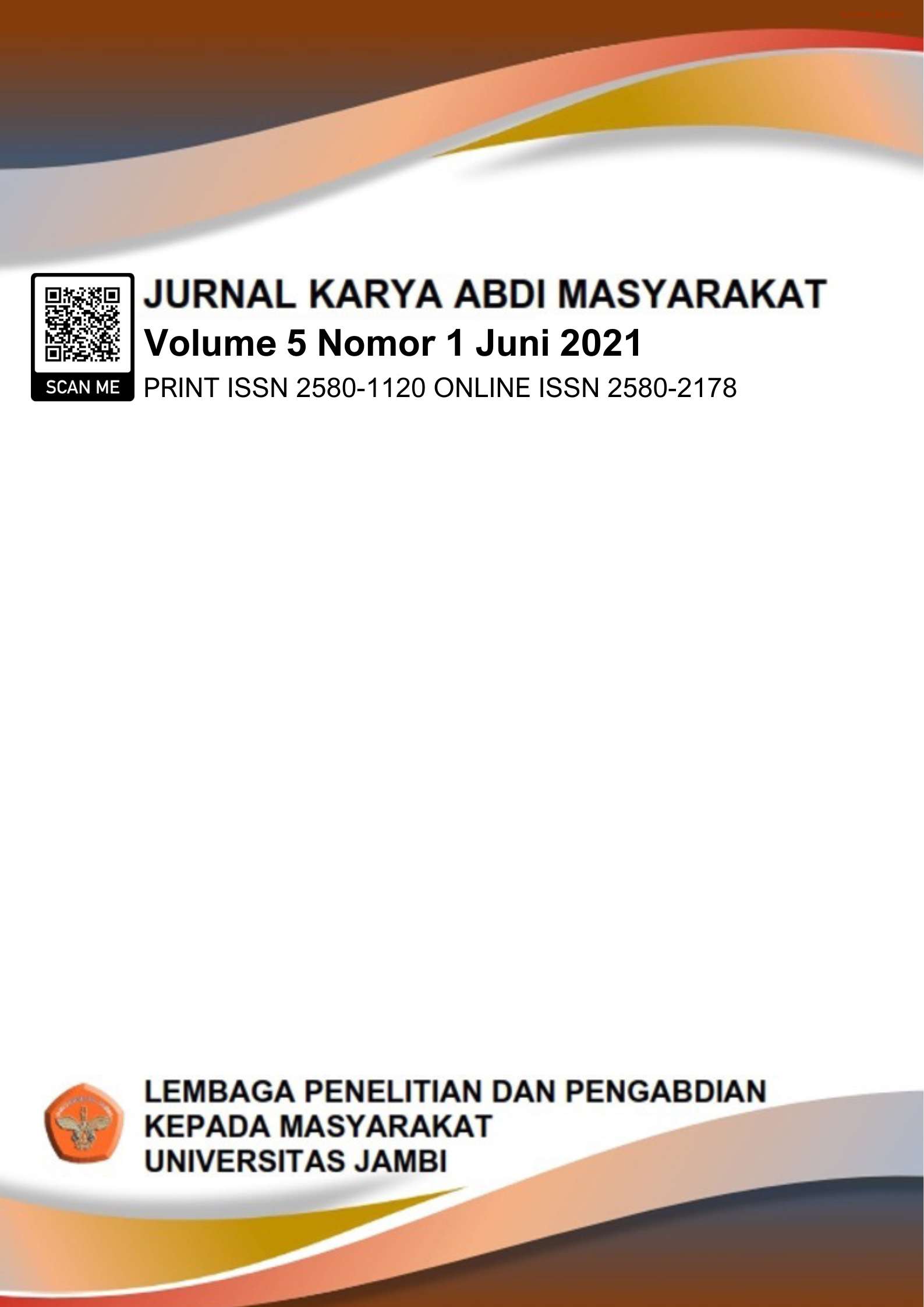Penguatan Fungsi Badan Permusyawaratan Desa di Kecamatan Damar Melalui Pendampingan Penyusunan Rancangan Peraturan Desa Berbasis Kearifan Lokal
DOI:
https://doi.org/10.22437/jkam.v5i1.13804Abstract
Badan Permusyawaratan Desa atau BPD memiliki tugas dan fungsi yang strategis dalam mengawal pembangunan desa. Salahsatunya adalah fungsi legislasi atau penyusunan peraturan desa bersama-sama dengan Kepala Desa. Regulasi desa pada prinsipnya dibuat untuk menunjang pengembangan desa dari berbagai sektor sesuai dengan potensi sumber daya alam maupun sumber daya manusia yang dimiliki. Jadi peraturan desa seyogyanya tidak sebatas mengatur perihal administrasi, dan keuangan saja yang menjadi rutinitas setiap tahun, tetapi juga penting untuk berbasis kearifan lokal. Kondisi inilah yang terjadi dikecamatan Damar, Kabupaten Belitung Timur dimana produk peraturan desanya masih minim terkait sektor tertentu yang berbasis kearifan lokal. Berdasarkan permasalahan tersebut, maka penting dilakukan penguatan fungsi Badan Permusyawaratan Desa melalui pendampingan penyusunan rancangan peraturan desa berbasis kearifan lokal. Kegiatan pengabdian ini bertujuan untuk memberikan sosialisasi, pemahaman dan pelatihan serta motivasi kepada anggota BPD di 5 (lima) desa yang ada di Kecamatan Damar yakni, Desa Mengkubang, Desa Burung Mandi, Desa Mempaya, Desa Aik Kelik dan Desa Sukamandi. Kegiatan ini meliputi 4 kegiatan utama, pertama sosilisasi penyusunan Rancangan Peraturan Desa (Raperdes) Berbasis kearifan lokal dengan peserta anggota BPD, dan Narasumber dari Camat Damar, Kepala Bagian Hukum Setda Kabupaten Belitung Timur dan Direktur Lembaga Demokrasi dan Politik Lokal Bangka Belitung. Kedua, pembuatan X-Banner alur penyusunan Raperdes, ketiga pembuatan buku saku legal drafting Raperdes dan keempat publikasi kegiatan agar dapat tersosialisasi secara luas. X-Banner dan Buku saku diberikan kepada semua BPD.
Downloads
Downloads
Published
How to Cite
Issue
Section
License
Copyright (c) 2021 Dwi Haryadi, Sri Rahayu, Muhammad Syaiful Anwar

This work is licensed under a Creative Commons Attribution-NonCommercial-ShareAlike 4.0 International License.
Please find the rights and licenses in Jurnal Jurnal Karya Abdi Masyarakat (JKAM).
- License
The non-commercial use of the article will be governed by the Creative Commons Attribution license as currently displayed on Creative Commons Attribution 4.0 International License.
- Authors Warranties
The author warrants that the article is original, written by stated author(s), has not been published before, contains no unlawful statements, does not infringe the rights of others, is subject to copyright that is vested exclusively in the author and free of any third party rights, and that any necessary written permissions to quote from other sources have been obtained by the author(s).
- User Rights
JKAM's spirit is to disseminate articles published are as free as possible. Under the Creative Commons license, JKAM permits users to copy, distribute, display, and perform the work for non-commercial purposes only. Users will also need to attribute authors and JKAM on distributing works in the journal.
- Rights of Authors
Authors retain the following rights:
- Copyright, and other proprietary rights relating to the article, such as patent rights,
- The right to use the substance of the article in future own works, including lectures and books,
- The right to reproduce the article for own purposes, provided the copies are not offered for sale,
- The right to self-archive the article.
- Co-Authorship
If the article was jointly prepared by other authors, the signatory of this form warrants that he/she has been authorized by all co-authors to sign this agreement on their behalf, and agrees to inform his/her co-authors of the terms of this agreement.
- Termination
This agreement can be terminated by the author or JKAM upon two months notice where the other party has materially breached this agreement and failed to remedy such breach within a month of being given the terminating party notice requesting such breach to be remedied. No breach or violation of this agreement will cause this agreement or any license granted in it to terminate automatically or affect the definition of JKAM.
- Royalties
This agreement entitles the author to no royalties or other fees. To such extent as legally permissible, the author waives his or her right to collect royalties relative to the article in respect of any use of the article by JKAM or its sublicensee.
- Miscellaneous
JKAM will publish the article (or have it published) in the journal if the articles editorial process is successfully completed and JKAM or its sublicensee has become obligated to have the article published. JKAM may conform the article to a style of punctuation, spelling, capitalization, referencing and usage that it deems appropriate. The author acknowledges that the article may be published so that it will be publicly accessible and such access will be free of charge for the readers.














